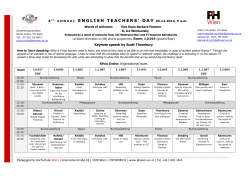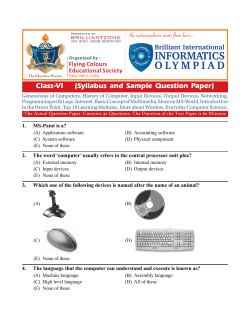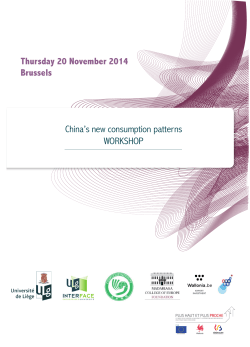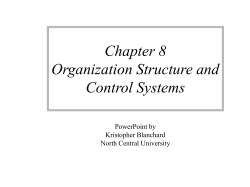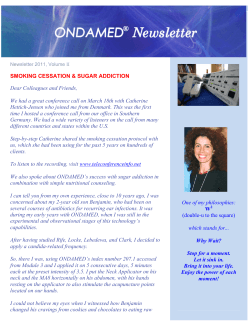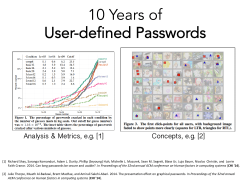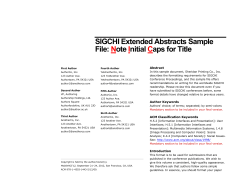
CV - Silvia Lindtner
SILVIA LINDTNER E. lindtner@umich.edu T. (US) +1-646-896-4469 T. (China) +86-18621604225 www.silvialindtner.com UNIVERSITY OF MICHIGAN School of Information SHORT BIO Silvia Lindtner is an assistant professor at the University of Michigan in the School of Information, with an affiliated appointment in the Center for Chinese Studies and the Science and Technology Studies (STS) Program. She is also the co-founder of the research hub Hacked Matter (www.hackedmatter.com), dedicated to investigating processes of technology innovation in China (www.hackedmatter.com). Her research investigates the role digital technologies play in global processes of innovation, work and labor, as sites of expressions of selfhood and collectivity, and in relation to political, social and economic processes of urban redesign. She explores these themes through a contemporary research project; DIY (do it yourself) maker and hacker culture, with a particular focus on its intersections with manufacturing and creative industry development in China. Her work is published across the fields of digital media and information studies, cultural anthropology, China studies, science and technology studies, and humancomputer interaction. Lindtner is the recipient of a grant by the National Science Foundation, supporting her research on maker and hacker cultures in China and the United States. In additional, her work has been supported by the Chinese National Natural Science Foundation, two Intel Research grants, a Google Anita Borg Memorial Scholarship, and a Chinese Government Scholarship. www.silvialindtner.com EDUCATION Fall 2006 – Summer 2012 PH.D. INFORMATION & COMPUTER SCIENCES University of California, Irvine, CA Department of Informatics Advisor: Professor Paul Dourish Dissertation Title: Cultivating Creative China: Making and Remaking Cities, Citizens, Work and Innovation Silvia Lindtner | CV | www.silvialindtner.com 1 SILVIA LINDTNER Fall 2000 – June, 2004 University of Hagenberg, Linz, Austria M.S. of Applied Sciences (Diplom Ingenieur) in Media Technology and Design DISSERTATION Lindtner’s dissertation examines in ethnographic detail how creativity is cultivated by Chinese politicians, urban planners and a group at the forefront of China’s burgeoning creative vanguard; DIY (do it yourself) “makers.” Lindtner shows that China’s contemporary “remake” into an information society and knowledge economy is accomplished through partial alignments and parasitic collaborations between seemingly opposing groups such as countercultural technology producers, Communist politicians, urban planners and policy makers. She explores a series of productions by these actors such as DIY maker manifestos on free and open source technology production, governmental policy, space making projects such as the set up of creative industry clusters as well as China’s first hacker space. This work sheds light on shanzhai (山寨, copycat) technology production, an open manufacturing model unique to the southern region of China, which has received increasing attention by the international maker scene and as a site of Chinese modernization amidst wider geopolitical transformations of industrial production. Lindtner’s dissertation research was in part supported by the National Science Foundation, a Chinese Government grant, the Google Anita Borg Women Scholarship Foundation, the Center for Organization Research (COR), and Intel Labs. PROFESSIONAL EXPERIENCE 09/2012 – 08/2014 RESEARCH SCIENTIST & POST-DOCTORAL RESEARCH FELLOW University of California, Irvine Department of Informatics & ISTC-Social (Intel Science & Technology Center for Social Computing) Fudan University, Shanghai School of Computer Science Supported by a grant from the US National Science Foundation (NSF award #1321065) and a post-doctoral scholarship from Intel Labs, Lindtner has spent her appointment as post-doctoral fellow expanding from her dissertation research, tracing the professionalization of both Chinese and Silvia Lindtner | CV | www.silvialindtner.com 2 SILVIA LINDTNER US maker culture all the way from a grassroots hobbyist movement to the proliferation of making as innovation pathway, experimentations in entrepreneurship, increasing government support, and corporate investment. This ongoing research documents how the Southern region of China, and the manufacturing hub of Shenzhen in particular, came to figure in people’s imaginary as a new center for innovation, where small- and large-scale entities such as hardware start-ups, Chinese shanzhai (copycat) manufacturing culture, and tech giants like Intel and Foxconn forge new relationships in their quest for a future of electronic making. Findings from this work were recently published in the proceedings of the ACM Conference on Human Factors in Computing Systems (CHI) and won a SIGCHI best of CHI 2014 paper award (Lindtner et al. 2014). 09/2006 – 09/2012 GRADUADTE RESEARCH ASSISTANT University of California, Irvine Department of Informatics Advisor: Prof. Paul Dourish During her graduate student career, Lindtner conducted research in the following three areas: 1) DIY making and hacking cultures 2) creativity and innovation discourse, Internet counterculture and youth gaming culture in China 3) media sharing practices and interaction design. Throughout this appointment, she has conducted user studies, design work as well as long-term ethnographic research in China. She collaborated in interdisciplinary and cross-cultural teams with other students and faculty from UC Irvine, the University of Pennsylvania, Central European University, Peking University, and Fudan University, Shanghai, as well as with industry partners such as Intel Labs. 08/2008 – 12/2008 RESEARCH INTERN People and Practices Research, Intel Mentor: Ken Anderson Lindtner conducted ethnographic research in Shanghai, Beijing and Hangzhou to explore technology use and leisure practices among Chinese IT professionals working for international corporations. The research contributes to globalization studies, theories of productive play and digital media studies with a particular focus on questions of class, participation, and cultural imagination. 12/2004 – 08/2006 RESEARCH SCIENTIST User Interface Design Group, Siemens Corporate Technology, Munich, Germany. User Experience Group, Siemens Corporate Research, Princeton, NJ. Research Area: ubiquitous computing, smart homes, health care, proactive health care, intervention, mobile communication, game design and mobile interaction design. Silvia Lindtner | CV | www.silvialindtner.com 3 SILVIA LINDTNER Cooperation Partners: Information and Communication Technology Group Siemens, EU-Project on Smart Homes. 12/2003 – 07/2004 RESEARCH INTERN User Interface Design Group, Siemens Corporate Technology, Munich, Germany. Mentor: Dr Hubertus Hohl. Research Areas: Computer Supported Collaborative Work, mobile computing, Human-Computer Interaction. Lindtner designed and developed two mobile photo-sharing applications for remote collaboration. A user study, two focus groups and a series of usability studies were conducted. 07/2002 – 09/2002 INTERN: MOBILE DESIGN AND DEVELOPMENT Xidris Mobile Communication, Vienna, Austria Concept design and implementation of mobile game applications, graphic design, poster design, website design. Animation design and video postproduction with Adobe After Effects. TEACHING EXPERIENCE Fall 2006 SOCIAL ANALYSIS OF COMPUTERIZATION Bachelor Level, 50 students University of California, Irvine Reader for Dr. Charlotte Lee This course familiarized students with various social analytical approaches to the study of computerization. They learned how to think about computerization as social phenomenon. Lindtner provided assistance with selecting course materials, designing assignments and exams, as well as grading. Winter 2007 HUMAN COMPUTER INTERACTION bachelor level, 60 students University of California, Irvine Teaching Assistant for Professor Don Patterson The goal of this course was to present basic principles of human-computer interaction (HCI). Lindtner assisted with course design and assignments, and lead weekly discussion sections to familiarize students with the concepts discussed during the lectures through Q&A sessions, additional texts and practical examples from research and industry. Spring 2007 HUMAN COMPUTER INTERACTIONS PROJECTS bachelor level, 40 students Silvia Lindtner | CV | www.silvialindtner.com 4 SILVIA LINDTNER University of California, Irvine Teaching Assistant for Professor Don Patterson The goal of this project course was to prepare students to create and evaluate user interfaces to software systems through a one-quarter project. Lindtner provided in-depth mentorship during students’ design projects through weekly one-on-one meetings including system implication, team management and sourcing of relevant materials. She also taught weekly discussion sections to facilitate discussion across the project groups. Fall 2009 PROJECTS IN UBIQUITOUS COMPUTING bachelor & master level, 15 students University of California, Irvine Teaching Assistant for Professor Gillian Hayes The goal of the course was to help students understand how to design and participate in research prototyping for Ubicomp systems, as well as engage undergraduate and graduate students together on projects. Lindtner mentored students in research and prototypical development, and assisted with acquisition of course materials and course lectures. She provided students with support during the implementation of the projects, and taught them how to develop structure and content throughout the course as well as their final project presentations. Fall 2014 ADVANCED PROJECT AND SOCIAL COMPUTING DESIGN master level, 25 students University of Michigan School of Information Instructor This advanced project course teaches students how to move from "making a prototype" to "making a product” by drawing from approaches in humancentered design, open hardware and manufacturing, DIY making, and product conceptualization. Students work in small teams to develop a product idea and its possible realization. The class provides an introduction to ethnographic research and design methods such as teamwork, prototyping, brainstorming, project presentation and pitching. This is a studio class that combines design with critical reflection and debate on concepts such as open innovation, open source, making, manufacturing, copy, and intellectual property. Winter 2015 INTRODUCTION TO INTERACTION DESIGN Master level, 30 students University of Michigan School of Information Instructor In this course, students learn methods and skills involved in designing and prototyping interactive systems. The course covers the design process Silvia Lindtner | CV | www.silvialindtner.com 5 SILVIA LINDTNER from the initial formulation of a design problem to creation of digital prototypes. An essential element of this course is a reflective engagement with the design process. The class structure is a mix of classroom design activities, lectures, and design critiques of student work by peers and instructor. The course focuses on design methods and design thinking, and will allow students to develop their design sensibilities and practical skills through a series of design exercises. The course covers individual and group ideation techniques; sketching on paper and using software tools; prototyping approaches, tools, and techniques; tactics from critical making and reflective design; and contemporary perspectives on interaction design for common platforms (e.g., web, desktop, tablet, mobile, and beyond). The course combines readings, lectures, and in-class exercises to convey and reinforce the intellectual content. PUBLICATIONS Journal articles & book chapters Lindtner, S. 2014. Hackerspaces and the Internet of Things in China: How Makers are reinventing industrial production, innovation and the self. China Information, Vol. 28 (2), 145-167. Williams, A., Lindtner, S., Anderson, K., Dourish, P. 2013. Multi-sited Design: An Analytical Lens for Transnational HCI. Human-Computer Interaction, Vol. 29:1, 78-108. Lindtner, S. and Li, D. 2012. Created in China: The Makings of China’s Hackerspace Community. ACM Interactions, Community & Culture, December 2012. Lindtner, S. and Dourish, P. 2011. The Promise of Play: A New Approach towards Productive Play. Games and Culture Journal, 6(5), 453 - 478. Lindtner, S., Chen, J., Hayes, G., Dourish, P. 2011. Towards a Frameworks of Publics: Re-encountering Media Sharing and its User. ACM Transactions on Human-Computer Interaction (ACM TOCHI) Journal, Vol. 18 (2), 23pp. Lindtner, S. and Szablewicz, M. 2011. China’s many Internets: Participation and Sites of Game Play Across a Changing Technology Landscape. Book Chapter in: Online Society in China: Creating, celebrating, and instrumentalizing the online carnival, eds. Herold, D.K. and Marolt, P. London & New York: Routledge, 89pp. Silvia Lindtner | CV | www.silvialindtner.com 6 SILVIA LINDTNER Peer-reviewed conference papers Sun, Y., Lindtner, S., Ding, X., Lu, T., Gu, N. To appear 2015. Reliving the Past and Making a Harmonious Society Today: A study of elderly electronic hackers in China. In the Proceedings of CSCW’15, Vancouver, Canada. Recipient of Best Paper Award. Lindtner, Silvia, Hertz, Garnet, and Dourish, Paul. 2014. Emerging Sites of HCI Innovation: Hackerspaces, Hardware Start-ups & Incubators, In Proc. of the ACM SIGCHI Conference on Human Factors in Computing Systems CHI'14 (Toronto, Canada), pp.439-448. Recipient of the SIGCHI Best of CHI Paper Award. Ames, M., Bardzell, J., Bardzell, S., Lindtner, S., Mellis, D., Rosner, D. 2014. Making Cultures: Empowerment, Participation, and Democracy – or Not? Extended Abstracts of the ACM SIGCHI Conference on Human Factors in Computing Systems CHI'14 (Toronto, Canada), pp. 1087-1092. Sun, Y., Ding, X., Lindtner, S., Lu, T., Gu, N. 2014. Being senior and ICT: a study of seniors using ICT in China. Proceedings of the 32nd annual ACM conference on Human factors in computing systems (CHI’14), Toronto, Canada, pp. 3933-3942. Tengfei Liu, Xianghua Ding, Silvia Lindtner, Tun Lu, Ning Gu. 2013. The Collective Infrastructural Work of Electricity: Exploring Feedback in a Prepay University Dorm in China. The ACM International Joint Conference on Pervasive and Ubiquitous Computing (UbiComp’13), Zurich, Switzerland, pp. 295-304. Lindtner, S., Anderson, K., Dourish, P. 2012. Cultural Appropriation: Information Technologies as Sites of Transnational Imagination. Proc. of the ACM Conference on Computer Supported Collaborative Work, (Seattle, WA), pp.77-86. Vertesi, J., Lindtner, S., and Shklovski, I. 2011. Transnational HCI: humans, computers, and interactions in transnational contexts. Extended abstracts of the International Conference on Human Factors in Computing Systems (CHI 2011), Vancouver, Canada, pp. 61-64. Shklovski, I., Lindtner, S., Vertesi, J., and Dourish, P. 2010. Transnational Times: Locality, Globality and Mobility in Technology Design and Use. Proc. of the ACM International Conference on Ubiquitous Computing – Adjunct (Ubicomp 2010), Copenhagen, Denmark, 2010, pp. 515-518. Lindtner, S. and Szablewicz, M. 2010. In between Wang ba and Elite Entertainment: China’s Many Internets. Chinese Internet Research Conference, Beijing, 2010. Receipt of best Student Paper Award. Lindtner, S., Mainwaring, S., Dourish, P., Wang, Y. 2009. Situating Productive Play: Online Gaming Practices and Guanxi in China. Proc. IFIP Silvia Lindtner | CV | www.silvialindtner.com 7 SILVIA LINDTNER Conf. Human-Computer Interaction INTERACT 2009 (Stockholm, Sweden), Lecture Notes in Computer Science LNCS 5736, pp. 328-341. Lindtner, S., Nardi, B., Wang, Y., Mainwaring, S., Jing, H., Liang, W. 2008. A Hybrid Cultural Ecology: World of Warcraft in China. Proc. of ACM Conference on Computer Supported Collaborative Work, November 2008, San Diego, California, USA, pp. 371-382. Lindtner, S. and Nardi, B. 2008. Venice, California and World of Warcraft: Persistence and Ephemerality in Playful Spaces. Proc. of the 41st Annual Hawaii International Conference on System Sciences (HICSS 2008), pp. 151. Lin, J., Mamykina, L., Lindtner, S., Delajoux, G., Strubs, H. 2006. Fish’n’Steps: encouraging physical activity with an Interactive Computer Game. Proc. of the International Conference on Ubiquitous Computing (Ubicomp 2006), (Irvine, CA), LNCS 4206, Springer, pp. 261-278. Edited Volumes Shklovski, I., Vertesi, J., Lindtner, S. 2013. Introduction to Special Issue on Transnational HCI. Human-Computer Interaction, 29 (1), pp. 1-21. In collaboration with Lucy Suchman. Talks, Paper Presentations & Conference Panels Invited Lecture: Lindtner, S. 2015. Making with Chinese Characteristics. At the Shenzhen Industrial Design Faire, November 27-December 2, 2014, Shenzhen, China. Paper-based Talk: Lindtner, S. 2014. Who are the Producers of the Chinese Internet? A report from the field. At the 12th Chinese Internet Resarch Conference (CIRC12), Hong Kong. Panel Co-organizer and Speaker: Lindtner, S. 2014. Provocation: Open Source is just a Cool Label for Free Labor. Panel on “Making Cultures: Empowerment, Participation, Democracty – or Not?” at the ACM SIGCHI Conference on Human Factors in Computing Systems CHI'14 (Toronto, Canada. Invited Session Speaker: Lindtner, S. 2014. Made with China: Hackers, Makers & Manufacturers. SXSW 2014, SXSW Interactive, Austin, Texas. Invited Speaker: Lindtner, S. 2013. Emerging Sites of Innovation: Hackerspaces, Hardware Start-ups & Chinese Manufacturers. USC Annenberg Crunch Series, Fall 2013. Silvia Lindtner | CV | www.silvialindtner.com 8 SILVIA LINDTNER Invited Talk: Lindtner, S. 2013. Make with China. DOIT Festival Taipei, October 2013, Winter 2013. Invited Guest Lecture: Lindtner, S. 2013. Parasitic Alliances. National University of Singapore, Winter 2013. Paper-based Talk: Lindtner, S. 2013. From Hobby to Profession: When DIY Makers collaborate with Chinese Manufacturers. Panel on "Design and Digital Fabrication," organized by Laura Forlano, AAA Annual Meeting of the American Anthropological Association, Chicago, IL, Nov 20, 2013. Co-organizer of panel series: Lindtner, S., Forlano, L., DiSalvo, C. 2013. "From DIY Craft to Science and Technology Work: The Remaking of Hacker and Maker Culture." Annual Meeting of the Society for Social Studies of Science (4S 2013), San Diego, CA, October, 2013. Paper-based Presentation: Lindtner, S. 2012, Cultivating a Creative Workforce: China’s emerging hackerspace network. Annual Meeting of the Society for Social Studies of Science (4S 2012), October 17-20, 2012, as part of the panel on “Hacking STS: bio-hacking, open hardware development, and hackerspaces.” Paper Presentation: Lindtner, S. 2012. Cultivating Creativity. Making Cities, Citizens and Platforms in Shanghai. At the 10th Chinese Internet Research Conference (CIRC10), USC, May 21-22. Invited Speaker: Lindtner, S. 2012, “Cultivating Creativity: The Makings of China’s Information Society” at MSR Asia (Microsoft Research Asia), Beijing, China, April 27, 2012. Panel Chair and Paper Presentation: Lindtner, S. 2011. Multi-Sited Design D.I.Y., Shanzhai and Internet Counterculture in Shanghai, China. At the Annual Meeting of the American Anthropological Association (AAA 2011), Nov 16 – 20, 2011, Montreal, Canada. Paper presentation: Lindtner, S., 2011. Emerging Technoscientific Productions in Urban China: Transnational Imaginations of Free Culture, Open Innovation and Alternate Futures. At the International Conference on “Governing Futures. Imagining, negotiating and taming emerging technosciences” organized by the Department of Social Studies of Science at the University of Vienna, September 22-24, 2011,Vienna, Austria. Paper-based Talk: Lindtner, S., 2011. Transnational Makings of Internet Counterculture, Open Sharing and Alternate Worlds in Shanghai, China. Conference on “Growing up and growing old in Shanghai, Delhi and Tokyo. Intergenerational stories from Asia’s global cities,” organized by the Cluster Silvia Lindtner | CV | www.silvialindtner.com 9 SILVIA LINDTNER research group “New Urban Imaginaries of the Public in Asia and Europe,” September 7 – 10, 2011, Shanghai, China. Paper Presentation: Lindtner, S., 2011. China’s Many Internets: Digital Participation across a Changing Technology Landscape. At the Annual Conference of the Association of Asian Studies (AAS 2011), March 31 – April 3, 2011, Honolulu, Hawaii. Invited Speaker: Lindtner, S. 2011. Sites of Collaboration in an Interconnected World: Globalization, Digital Geographies and Transnational Actors”. At the Annual Milton Wolf Seminar on Media and Diplomacy, jointly organized by the Center for Global Communication Studies at the Annenberg School of Communication, University of Pennsylvania, the Diplomatic Academy Vienna and the American Austrian Foundation, March 23 – 35, 2011, Vienna, Austria. Paper-based talk: Lindtner, S., 2011. New Collectives in Urban China: A transnational scene of open sharing across digital and physical spaces. At the Annual Conference on Digital Media and Learning (DML 2011), March 3-5, 2011, Long Beach, CA, USA. Panel Chair and Speaker: Lindtner, S. 2011. Reconfiguring Productive Media Use: Urban Renewal and Being on the Move in China. At the First Conference on Digital Media and Learning (DML 2011), March 3 – 5, 2011, San Diego, CA, USA. Paper-based talk: Lindtner, S., 2010. Digital Technologies & Urban China: Multiple Sites of Design. At the Workshop on “Urbanity on the Move: Planning, Mobility and Displacement,” Department of Anthropology, UC Irvine, May 21, 2010, Irvine, CA, USA. Paper-based talk: Lindtner, S., 2009. Gaming Codes in China: Cultivating Cool and Socio-technical Distinction Work. Annual Meeting of the Society for Social Studies of Science (4S 2009), as part of the Panel on “What is Code? What is Coding? Emerging STS approaches in studying computer code” (organized by Stephane Couture and Marisa Cohn), at the October 28 – 31, Washington, DC, USA WORKSHOP & CONFERENCE ORGANIZATION Silvia Lindtner, Anna Greenspan and David Li. 2014. Hacked Matter Conference (HMC 2014) on “Encountering the Future,” Shenzhen, China, April 6-8, 2014, in partnership with the IFTF (Institute for the Future) and the Shenzhen Maker Faire. In part supported by the National Science Foundation (NSF) (under award #1321065), ISTC-Social and Intel. Weblink: www.hackedmatter.com/workshop-3 Silvia Lindtner | CV | www.silvialindtner.com 10 SILVIA LINDTNER Silvia Lindtner, Anna Greenspan and David Li. 2014. Hacked Matter Workshop (HMW 2014) on “Making the Machines of Tomorrow,” Shanghai, China, October 18-21, 2014. In part supported by ISTC-Social, Intel, KIC, NYU Shanghai, DF Robot, Seeed Studio, DFRobot, and Transist. Weblink: www.hackedmatter.com/workshop-2 Silvia Lindtner and Anna Greenspan. 2013. Hacked Matter Workshop (HMW 2013): “Shanzhai 山寨 and DIY maker culture in China,” Shanghai & Shenzhen, April 6-8, 2013. In partnership with Shanghai Studies Society and XInCheJian. With Sponsorship from the Rockbund Contemporary Art Museum, NYU Shanghai, ISTC-Social, and XinCheJian. Weblink: www.hackedmatter.com/workshop-1 Silvia Lindtner and Garnet Hertz. 2013. Zine Making Workshop at the New York Hackerspace NYC Resistor. December 2013. In part supported by the National Science Foundation (NSF) (under award #1321065) and ISTCSocial. Garnet Hertz and Silvia Lindtner, 2012. Toyhacking workshop, Maker Carnival 创客嘉年华, Beijing, April 29 – May 1, 2012 Weblink: http://makercarnival.com/BringMeChina.html Lindtner, S., Smith, B., Coyer, K. 2011. Transfabric: A para-sitic workshop on Transnational D.I.Y. (Do It Yourself). Supported by the Center for Global Communication Studies, Annenberg School of Communication, University of Pennsylvania. Weblink: http://www.transfabric.org Vertesi, J., Lindtner, S., and Shklovski, I. 2011. Transnational HCI: humans, computers, and interactions in transnational contexts. Workshop at the International Conference on Human Factors in Computing Systems (CHI 2011), Vancouver, Canada. Shklovski, I., Lindtner, S., Vertesi, J., and Dourish, P. 2010. Transnational Times: Locality, Globality and Mobility in Technology Design and Use. Workshop at the International Conference on Ubiquitous Computing (Ubicomp 2010), Copenhagen, Denmark, 2010. Baumer, E., Brewer, J., Brown, B., Leahu, L., Lindtner, S., Martin, L. 2009. Hybrid Design Practice. Workshop at the International Conference on Ubiquitous Computing (Ubicomp 2009), Florida, US. Short Papers, Posters, Demos Silvia Lindtner | CV | www.silvialindtner.com 11 SILVIA LINDTNER Lindtner, S. 2009. Cultivating Cool: Online and Mixed reality Gaming in China. Best Poster Award, in Proc. of the 2009 iConference. Lindtner, S. 2009. Socio-technical Distinction Work at Play in China. Doctoral Colloquium at the European Conference on Computer Supported Cooperative Work (ECSCW), Vienna, Austria. Noak, N., Lindtner, S., Nguyen, J., Hayes, G. 2008. LoRy: A Locative Story Game to Encourage Playful and Social Learning. Short Paper for Demo at the Conference on Interaction Design for Children (IDC), Chicago. Lindtner, S. and Chen, J., 2007. mopix: playful encounters with Surveillance in Everyday Urban Settings, in Proc. of ACM International Conference on Ubiquitous Computing, Ubicomp'07. Position Papers Lindtner, S. 2010. The Politics of Design-Use Relations in Transnational Configuratons: What is your Position? Position Paper for the workshop “Transnational Times. Locality, globality and mobility in technology design and use,” held at the ACM International Conference on Ubiquitous Computing (Ubicomp 2010), Copenhagen, Denmark. Lindtner, S. 2010. Google.cn and beyond: The Culture and Politics of Digital Media in China. Position paper for the Third China Undisciplined Conference, UCLA, Cotsen Institute of Archaeology, May, 2010. Lindtner, S. and Dourish, P. 2009. From the Californian Ideology to China’s Internet Cafes. Position Paper for the workshop “Culture and Technologies for Social Interaction” held at the 12th IFIO TC13 Conference on HumanComputer Interaction, Uppsala, Sweden. Lindtner, S., Mainwaring, S., Anderson, K. 2009. Facing the Crowd: Cocooning and Leveling Up in China's Urban Sprawls. Position Paper for the workshop "crowd computing," held at the International Conference on Human Factors in Computing Systems (CHI 2009), Boston, MA. Lindtner, S. and Nardi, B., 2008. Mixed Realities in China’s Internet Cafes, Position Paper for the workshop Urban Mixed Realities hold at the International Conference on Human Factors in Computing Systems (CHI 2008), Florence, Italy. Lindtner, S. and Nardi, B., 2008. Realities that matter: Doings and Makings of an Online Game, Position paper for the Workshop Cultures of Virtual Worlds held at the University of California, Irvine. Silvia Lindtner | CV | www.silvialindtner.com 12 SILVIA LINDTNER Dourish, P., Hayes, G., Irani, L., Lee, C.P., Lindtner, S., Nardi, B., Patterson, D., Tomlinson, B., 2008. Informatics at UC Irvine. Proc. of International Conference on Human Factors in Computing Systems (CHI 2008), Research Landscapes. Lindtner, S., 2008. Educational Games and Mixed Realities: What I learned from Chinese Online Game Players, HCIC Boaster, Fraser, Colorado. Lindtner, S., 2007. Playful Spaces between Fantasy and Real, Position paper for the workshop “Supple Interfaces” held at the International Conference on Human Factors in Computing Systems (CHI 2007), San Jose, CA, April, 2007. SCHOLARSHIPS, GRANTS & AWARDS NSF IIS HCC award (#1321065), 2013-2016, “How Do-it-yourself makers reinvent production, labor, and innovation. Recipient of the Chinese Government Scholarship, 2011-12. SIGCHI Best of CHI Paper Award: Lindtner, Silvia, Hertz, Garnet, and Dourish, Paul. 2014. Emerging Sites of HCI Innovation: Hackerspaces, Hardware Start-ups & Incubators, Prof. of ACM Conference Human Factors in Computing Systems CHI'14 (Toronto, Canada). Best Student Paper Award, Chinese Internet Research Conference 2010, for: Lindtner, S. and Szablewicz, M. "In between Wangba and Elite Entertainment: China's Many Internets" 2010 Intel Research Grant, awarded by PaPR (People and Practices Research) to conduct research on "From Media Use to Media Production: An Ethnography of Digital Media Collectives in Urban China." 2010 Winner of the Student Essay Competition for the Milton Wolf Seminar on “New Media, New Newsmakers, New Public Diplomacy: The Changing Role of Journalists, NGOs, and Diplomats in a multi-modal media world,” Diplomatische Akademie Wien, the American Austrian Foundation and the Annenberg School for Communication, Vienna, Austria. Recipient of the Google Anita Borg Memorial Scholarship, 2008 Recipient of a GDC student scholarship 2008 Silvia Lindtner | CV | www.silvialindtner.com 13 SILVIA LINDTNER SERVICE ACTIVITIES Peer Review MIT Press Journal of Asian Studies Journal of Critical Studies of Peer Production CHI (ACM Conference on Human Factors in Computing Systems) CSCW (ACM Conference on Computer-Supported Cooperative Work) UBICOMP (ACM Conference on Ubiquitous Computing) DIS (ACM Conference on Designing Interactive Systems) PDC (Participatory Design Conference) INTERACT (IFIP Conference on Human-Computer Interaction) Student Volunteer ACM Conference on Human Factors in Computing Systems: CHI 2005, 2006, 2007 Conference on Ubiquitous Computing: Ubicomp 2007, Ubicomp 2009 Organizing Committees Program Committee Member Aarhus Conference 2015 Co-Chair Alt.CHI 2015, 2016 Program Committee Member ACM CHI 2014 Co-founder Hacked Matter, Research Think Tank, 2012-today (www.hackedmatter.com) Co-Organizer of the Annual Interdisciplinary Student Workshop, University of California, Irvine, May 2008. Co-Founder and Co-Chair Organization of IGSA - Informatics Graduate Silvia Lindtner | CV | www.silvialindtner.com 14 SILVIA LINDTNER Student Association, UC Irvine, 2007, 2008. Co-Chair Organization & Funding Chair for the first Workshop for Information-School Doctoral Students, 2009. Student volunteer Co-Chair, for the International Conference on Ubiquitous Computing, 2010 LANGUAGES German (native) English (fluent) Mandarin Chinese (Intermediary) French (Intermediary) Latin (written) Silvia Lindtner | CV | www.silvialindtner.com 15
© Copyright 2025
